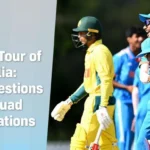The much-anticipated announcement is here — Shubman Gill has been appointed as the new ODI captain of the Indian cricket team.
The legendary Rohit Sharma is no longer India’s captain, marking the end of an era and the beginning of a new one.
Indian cricket fans have mixed feelings. On one hand, it’s a positive step toward the future — grooming a young leader with the 2027 World Cup in mind. On the other hand, it’s hard to imagine Indian cricket without Rohit Sharma leading the side.
Rohit Sharma’s Legendary Captaincy Tenure
Rohit Sharma’s captaincy journey has been nothing short of legendary.
Except for that one bad day — the 2023 World Cup final — everything under his leadership was near perfect.
- ODI Cricket: India remained unbeaten until the World Cup final.
- T20 World Cup: Unbeaten run till the semi-final.
- Champions Trophy: Lifted the cup unbeaten.
Rohit’s leadership has been defined by calmness, strategy, and results. His win percentage of 76% speaks volumes about his success.
Was the Change Really Necessary?
Now the question arises — was this change needed?
When you already have a captain as capable and hungry as Rohit Sharma, why experiment with Shubman Gill ahead of the 2027 World Cup?
Both Rohit Sharma and Virat Kohli are likely to remain fit and available for the next two years since they’re no longer playing all formats. That means there’s no fitness issue to worry about.
Still, selectors chose to take a bold step. Only time will tell if this was the right decision.
The Shubman Gill Factor
To be fair, Shubman Gill has shown immense promise as a player.
His ODI record is excellent, and he impressed as captain during the England Test series.
So, from a BCCI and selectors’ perspective, promoting Gill makes sense.
Yet, it remains a test of time — whether this “experiment” will succeed or backfire by the 2027 World Cup.
Rohit and Virat’s Future Unclear
Chief selector Ajit Agarkar has not given a clear answer about the presence of Rohit Sharma and Virat Kohli in the 2027 World Cup squad.
His comments were vague — focusing only on the “current situation.”
It’s evident that their performance in the upcoming Australia and South Africa series will determine their World Cup fate.
If they fail to perform, they could be dropped — a reality visible even in Agarkar’s tone and body language.
The Jadeja Controversy
Among all the selection debates, one decision is completely unacceptable — the exclusion of Ravindra Jadeja from the ODI squad.
Why was he dropped despite being in top form and even earning the Man of the Match award in the recent West Indies Test?
Jadeja, who was also made Test vice-captain, seems to have been made the scapegoat in a team looking to promote youngsters.
Dropping him from ODIs feels nothing short of a crime.
Positive Moves: Shreyas Iyer as Vice-Captain
On a positive note, Shreyas Iyer has been appointed as the ODI vice-captain — a smart move.
He serves as a reliable backup to Gill, showing the selectors’ intent to build leadership depth.
Sanju Samson Snubbed Again
Another controversial call is the exclusion of Sanju Samson from the ODI squad.
Instead, Dhruv Jurel has been picked as the wicketkeeper.
This is puzzling because Samson’s recent ODI century came against South Africa — the very host of the upcoming 2027 World Cup.
His record on South African pitches is far superior to Jurel’s, making his omission difficult to justify.
Still, since Samson is part of the T20 squad, strong performances there could open the ODI door again.
Other Notable Inclusions
The ODI squad includes promising names like:
- Nitish Kumar Reddy
- Washington Sundar
- Kuldeep Yadav
- Harshit Rana
Notably, Jasprit Bumrah is missing, likely rested.
The team looks balanced overall, though certain choices remain questionable — especially the consistent inclusion of Harshit Rana across formats.
Shubman Gill in T20: The All-Format Captain Dream
Selectors clearly see Shubman Gill as India’s future all-format leader.
However, this decision could cost opportunities for other players like Sanju Samson and Yashasvi Jaiswal, who may struggle for chances despite strong performances.
Gill’s inclusion as vice-captain in T20s also suggests he’s being groomed for the all-format captaincy role.
Selection Imbalance and Bias
It’s noticeable that Jitesh Sharma’s name appears above Sanju Samson’s on BCCI documents — a subtle indication of bias.
Even though Samson is expected to play, selectors seem to prioritize Jitesh, creating confusion between selectors’ choices and team management’s plans.
The Bowling Conundrum
In T20 selection, four spinners have been included — Varun Chakravarthy, Kuldeep Yadav, Axar Patel, and Washington Sundar — which seems unnecessary for Australian conditions.
Meanwhile, Prasidh Krishna, despite a strong IPL season, has been left out.
Harshit Rana, despite modest performances, finds a place in every squad, raising eyebrows among fans.
Have We Seen This Before?
Interestingly, this feels like déjà vu.
In 2017, when Virat Kohli was appointed India’s white-ball captain, Rohit Sharma had already won three IPL titles and was a proven leader.
India chose the poster boy approach then — and it cost several ICC trophies.
Now, with Gill as the new poster boy, BCCI might be repeating history.
The Emotional Goodbye
Rohit Sharma and Virat Kohli deserved to finish their careers on their own terms — especially with Rohit’s burning desire to win the 2027 World Cup and redeem the heartbreak of 2023.
BCCI should have allowed him to captain till then.
Still, this decision doesn’t mean Gill’s appointment is bad — it’s just a high-stakes experiment that could shape the next decade of Indian cricket.
Final Thoughts: A Risk Worth Taking?
Indian cricket stands at a crossroads.
Shubman Gill’s appointment as all-format captain marks a bold new chapter, but it also risks repeating past mistakes.
The real verdict will come only in 2027, when the World Cup concludes.
Until then, fans can only hope that this experiment does not backfire on BCCI — and that the new era brings glory, not regret.


